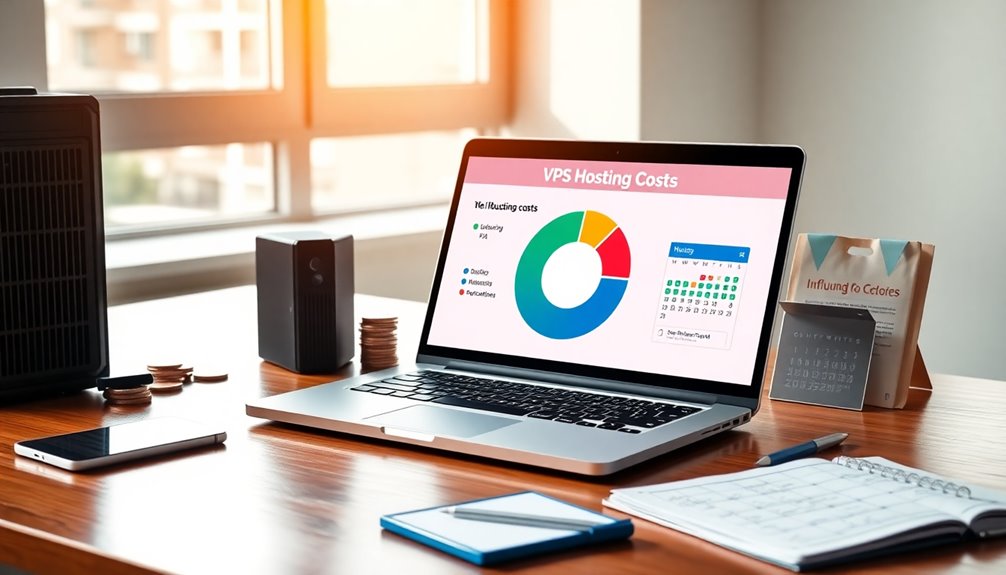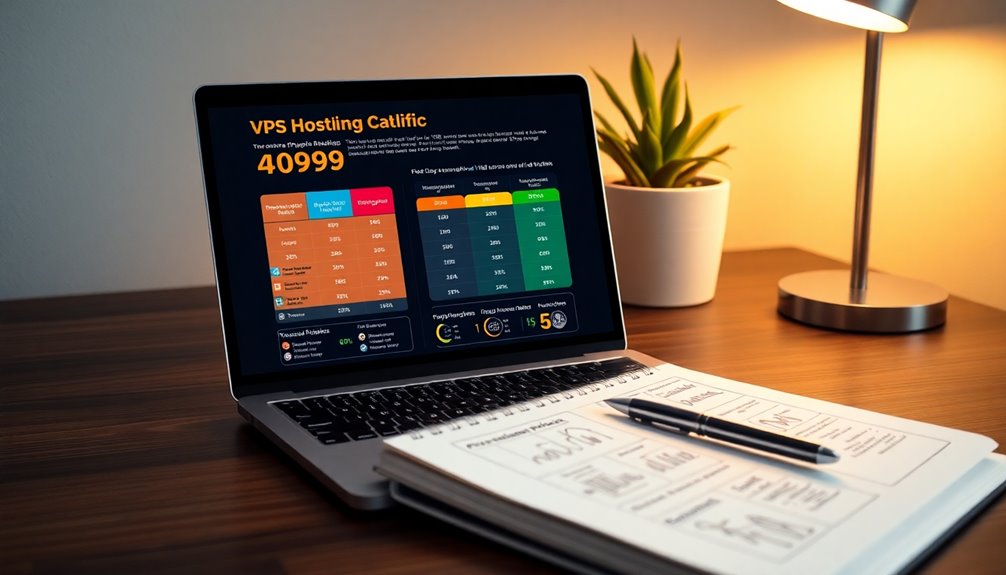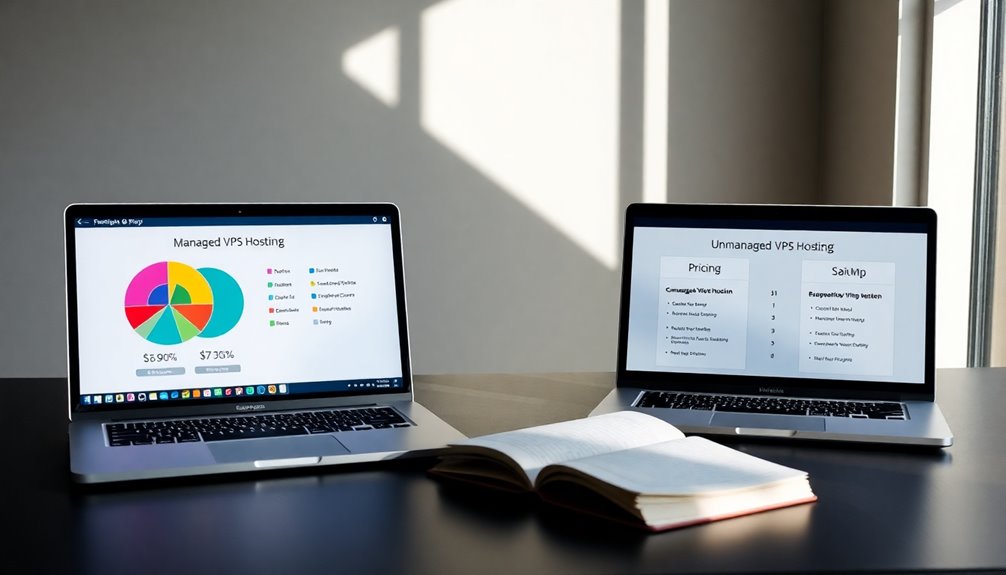VPS hosting costs range from $5 to $10 per month for basic plans, while mid-tier options can go from $13 to $48 monthly. High-performance plans typically run between $20 to $96, depending on factors like hardware specs and whether you choose managed or unmanaged services. Popular providers like Hostinger and Liquid Web offer competitive pricing. Want to learn about the factors that influence these costs and how to choose the right plan for you?
Key Takeaways
- VPS hosting costs range from $5 to $96/month, depending on the plan and features selected.
- Basic plans suit small projects, while mid-tier and high-performance options cater to larger needs.
- Managed services are more expensive but include technical support, while unmanaged services are budget-friendly for tech-savvy users.
- Factors influencing costs include hardware specifications, server location, and additional features like backups and security.
- Long-term commitments often yield discounts, and billing options vary from hourly to yearly.
Understanding VPS Hosting Pricing Tiers

When considering VPS hosting, how do you navigate the various pricing tiers available?
You'll find that basic plans typically start around $5 to $10 per month, offering limited resources suitable for small projects. If you need more power, mid-tier plans with 8GB RAM range from $13 to $48 monthly.
For high-performance options, you might pay between $20 and $96 for plans featuring 16GB RAM. Many providers, like SSD Nodes and Hostinger, offer competitive pricing, while others like DigitalOcean can be pricier.
Additionally, look for customization options and long-term discounts; committing to annual or multi-year plans often leads to lower monthly costs. Understanding these tiers helps you make an informed decision tailored to your needs.
Factors That Influence VPS Hosting Costs

Several factors influence the cost of VPS hosting, making it essential to understand what drives these prices.
First, hardware specifications like CPU cores, RAM, and storage type significantly impact costs; SSDs are faster but pricier than HDDs.
The server's location also matters, as data centers in high-cost regions can increase your expenses.
Additionally, whether you choose managed or unmanaged services affects pricing—managed options come with support and maintenance, while unmanaged ones require you to handle everything yourself.
Your choice of operating system and any add-ons, like backups or security features, will further affect the cost.
Lastly, scalability options can lead to higher prices if you need flexibility as your needs grow.
Comparing Popular VPS Hosting Providers

As you explore your options for VPS hosting, comparing popular providers can help you find the best fit for your needs and budget.
Hostinger starts at an attractive $4.04/month, offering 1 vCPU core and 4GB RAM, making it a great entry-level choice.
Liquid Web, on the other hand, provides fully managed services starting at $16.00/month, ideal for larger projects needing robust support.
A2 Hosting offers dynamic plans from $5.00/month, giving you flexibility in RAM and storage.
If you're considering unmanaged options, InMotion Hosting's VPS-1000S starts at $19.99/month.
Each provider has unique pricing structures, so evaluating these can guide you toward a solution that meets both your technical needs and financial constraints.
Plan Specifications and What They Offer

What can you expect from VPS hosting plans? Typically, you'll find a range of specifications tailored to meet your needs.
Most plans offer between 1 to 8 vCPU cores, with RAM options spanning from 4 GB to 32 GB. Storage can vary from 50 GB to 400 GB, often featuring SSDs for quicker access. Monthly bandwidth ranges from 1 TB to 32 TB, ensuring you have the capacity to manage traffic effectively.
You'll also benefit from unlimited inodes for file management and standardized I/O performance at 300 MB/s.
Expect at least one IPv4 and IPv6 address, along with customizable OS options like AlmaLinux, Ubuntu, or Debian.
With a 99.9% uptime guarantee and 24/7 support, reliability is paramount.
Billing Options Available for VPS Hosting

How can you choose the best billing option for your VPS hosting needs? First, consider your project's duration. If it's short-term, hourly billing from providers like LightNode might be ideal.
For flexibility, monthly billing lets you adjust your plan as needed. If you want to save money, look into yearly billing options, which often provide discounts. Pre-paying can also be advantageous, offering further savings and budgeting control.
Additionally, think about payment methods. Most providers accept credit cards, while some, like LightNode, offer PayPal.
Lastly, ensure you understand the billing transparency and support offered by your provider. Clear pricing helps avoid surprises, and quality customer support is essential for addressing any issues that arise.
Cost Optimization Strategies for VPS Hosting

To effectively manage costs for your VPS hosting, it's essential to implement a variety of optimization strategies that align with your specific needs.
Start by properly configuring your resources; choose a plan that meets your current demands without going overboard. Regularly assess your usage to identify savings and opt for scalable options.
For software, select lightweight applications and utilize caching mechanisms to improve performance.
On the network side, use Content Delivery Networks (CDNs) to lighten your server load and compress data to optimize transfer costs.
Lastly, choose a provider that offers competitive pricing and flexible contracts. Don't hesitate to negotiate for better rates, especially if you're committing long-term.
This proactive approach will keep your VPS hosting costs manageable.
Regional Variations in VPS Pricing

When managing VPS hosting costs, understanding regional pricing variations can help you make informed decisions. VPS pricing fluctuates significantly across countries.
For instance, in the United States, you might pay between $20 to $100 per month, while in the UK, it ranges from £15 to £80. Factors like infrastructure costs, competition, and local demand play crucial roles in these price differences.
Currency fluctuations can also impact international customers, making costs vary even more. Additionally, local regulations and taxes contribute to the overall pricing.
Managed vs. Unmanaged VPS Hosting

Deciding between managed and unmanaged VPS hosting can significantly impact your online operations, especially based on your technical expertise and business needs.
Managed VPS hosting tends to be more expensive since it includes 24/7 technical support and enhanced security features. This option suits those without in-house IT teams, as the provider handles management tasks and offers user-friendly control panels like cPanel.
On the other hand, unmanaged VPS hosting is more budget-friendly but requires a high level of technical knowledge for server management and security. It allows for greater flexibility and customization, making it ideal for tech-savvy users.
Ultimately, your choice should align with your resources, expertise, and specific performance requirements.
Add-Ons and Features Impacting VPS Costs

Choosing between managed and unmanaged VPS hosting sets the stage for understanding the various add-ons and features that can influence your overall costs.
Automated backups can boost your monthly fees, while SSL certificates enhance security at an extra charge. If you opt for advanced DDoS protection, expect a higher bill.
Control panels like cPanel or Plesk typically come with additional licensing fees, and each extra IP address you need will also increase your costs.
Additionally, factors like server location, hardware quality, and storage type play significant roles in pricing.
Remember that performance enhancements, such as more CPU cores and RAM, can also drive up your expenses.
Weigh these options carefully to align with your budget and requirements.
Frequently Asked Questions
What Is the Average Lifespan of a VPS Server?
The average lifespan of a VPS server typically ranges from 3 to 10 years, depending on how you use and maintain it.
Factors like hardware quality and regular software updates can greatly influence longevity.
If you keep an eye on performance and plan strategic upgrades, you can effectively extend its life.
Can I Upgrade My VPS Plan Anytime?
Yes, you can upgrade your VPS plan anytime with most providers.
You just need to log into your customer portal, select your VPS, and choose a new plan.
Keep in mind that upgrades might cause some temporary downtime, so it's best to do it during low traffic periods.
Also, remember that while upgrades are straightforward, downgrades may not be available once you've made the switch, so plan wisely!
Are There Any Hidden Fees With VPS Hosting?
Imagine buying a fancy cake, only to find out the frosting costs extra.
When it comes to VPS hosting, hidden fees can sneak up on you. You've got to watch for charges on backups, SSL certificates, or even extra support.
It's like finding unexpected toppings on a pizza. To avoid surprises, read the fine print and ask your provider about potential hidden costs before committing to a plan.
Your budget will thank you!
How Do I Choose the Right VPS Provider?
Choosing the right VPS provider involves evaluating several key factors.
Start by considering hardware specifications, like RAM and CPU, to ensure optimal performance.
Look at the provider's reputation and customer support quality, as reliable assistance is crucial.
Think about whether you need managed or unmanaged services based on your expertise.
Lastly, check scalability options, so you can adapt as your business grows.
Always read customer reviews to gauge satisfaction and reliability.
What Kind of Support Do VPS Providers Offer?
Imagine your website running smoothly, with a safety net always in place. VPS providers offer a range of support options to ensure this.
You can expect 24/7 technical assistance, robust security measures, and regular backups. If you opt for managed services, you'll enjoy full root access and priority support.
For those who prefer control, unmanaged options let you customize your server while offering basic assistance.
Choose wisely to match your needs!
Conclusion
In the world of VPS hosting, costs can vary widely, but understanding the pricing tiers and factors at play can help you make an informed decision. Think of it like shopping for a car; you wouldn't buy the first one you see without comparing features and prices. By exploring your options and optimizing costs, you'll find a plan that meets your needs without breaking the bank. So, gear up and choose wisely for your hosting journey!









